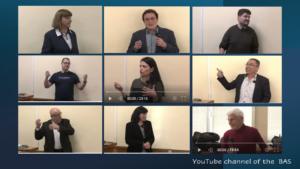Scientists and experts presented scientific data and concrete results from the application of new genomic techniques, the advantages and disadvantages of their use, the opportunities they provide for solving a range of problems in medicine and agriculture.
Prof. Dr. Valya Vassileva, Director of IPPG – BAS, made the presentation “Plant genome editing: a step towards a more sustainable future” (https://www.youtube.com/watch?v=95sZNDvqqLM&t=773s) which focused on the advances in genome editing technologies and the prospects for their application to achieve a more sustainable future.
Dr. Dilyana Kirova (https://www.youtube.com/watch?v=kSfYYR_V9YM) and Aleksander Atemin (https://www.youtube.com/watch?v=6HIhNo5S7kI) from the “Acad. Roumen Tsanev” Institute of Molecular Biology presented to the audience the current topic “CRISPR/Cas9 in research and biomedicine”, demonstrating the potential of innovative genome editing techniques for the treatment of genetic diseases, the development of new therapies and the sustainable improvement of human health.
Sen. Asst. Prof. Slavil Peykov, PhD (https://www.youtube.com/watch?v=Op5nQNwDkrs) from the Department of Genetics at the Faculty of Biology, Sofia University “St. Kliment Ohridski” discussed the prospects and ethical aspects in the use of new genomic technologies in his presentation “CRISPR/Cas9 in Human Genetics – Applications, Therapies, Ethical Dilemmas”. The report of Prof. Ivan Atanasov (https://www.youtube.com/watch?v=NsO3L3tE95c) from the AgroBioInstitute “New genomic techniques in agriculture and food industry” introduced the participants of the event to the applications of new genomic techniques in the agricultural sector and food industry, while Prof. Dr. Tsveta Georgieva (https://www.youtube.com/watch?v=EnSYbUrxUHk) from the National Center of Public Health and Analyses focused on the market aspects and opportunities that these technologies open with her presentation “Market applications of new genomic techniques (NGT)”.
Dr. Ivelin Rizov (https://www.youtube.com/watch?v=4jsb3T4jiGg) from the Ministry of Agriculture and Food presented the current trends in the regulation of new genomic techniques “Regulation of new genomic techniques” and Assoc. Prof. Dr. Bojin Bojinov (https://www.youtube.com/watch?v=i-wuE1UVfpo) from the Agricultural University of Plovdiv highlighted some scientific facts and common myths around them as well as the real facts in the presentation “Scientific facts and misconceptions about new genomic techniques”.
After the presentations, Academician Atanas Atanasov stressed the importance of returning to local agricultural practices and the application of modern technologies and methods in agriculture to ensure food security and reduce dependence on foreign products. Acad. Atanasov expressed optimism about Bulgaria’s potential to take a leading role in agriculture and biotechnology, using its unique natural and human resources.
The information day ended with a fruitful discussion where different perspectives on the topic were presented and the following messages were conveyed:
- Genome editing through technologies such as CRISPR-Cas9 represents a revolutionary advance in the biological and medical sciences, offering exceptional accuracy and efficiency. This system, which was developed by nature millions of years ago and subsequently adapted by humans, allows small, targeted changes to be made to DNA that approximate natural genetic changes as closely as possible. CRISPR-Cas9 opens the door to a wide range of applications in fields from agriculture to medicine that can accelerate scientific development and make innovations significantly more accessible.
- In agriculture, CRISPR-Cas9 enables faster creation of new varieties with desirable traits such as resistance to diseases and abiotic stress, or improved nutrient composition. Part of this promise is based on the ability to isolate genes from ancient varieties and integrate them into modern, productive cultivated plants.
- The cultivation of edited plants which do not contain foreign DNA and are therefore not transgenic in the traditional sense, offers a new route to exploiting the potential of these innovative technologies to create sustainable and safe agricultural products.
- Over 800 scientific publications and meta-analyses support the safety of genome editing by comparing it to traditional selection, establishing the technology as an important and reliable tool for scientific advancement. This opens the door to the responsible application of genome editing for the benefit of society while highlighting its potential to bring significant benefits in health, agriculture and other fields.
- Thanks to its affordability, CRISPR-Cas technology provides a unique opportunity for medium and small enterprises to play a significant role in the innovation process, allowing them to participate more broadly in research and new product development which until now has been the privilege mainly of large corporations with significant research budgets.
- In medicine, CRISPR-Cas9 technology is opening up opportunities to develop innovative genetic therapies that offer effective treatments for a range of diseases previously thought to be incurable, including some tumours and rare genetic conditions. Thanks to the accuracy and efficiency of CRISPR-Cas9, these treatments can be developed and tested with greater speed which will accelerate their reach to patients. The efforts of the scientific community in the research and application of CRISPR-CAS9 could lead to significant improvements in the quality and length of life of affected individuals providing hope for millions of people around the world suffering from a variety of genetic abnormalities.
- The scientific community is actively working to improve CRISPR-Cas9 and other genome editing technologies to reduce potential “off-target” effects and increase editing accuracy. New tools and methods are being developed to accurately detect and correct potential errors, paving the way to broader applications in medicine, agriculture and more. Such efforts demonstrate the drive of scientists to use genome editing responsibly to solve global challenges.
- Regulation and public opinion have a leading role to play in the future of genome editing, stimulating a balanced debate between scientific progress and ethical, social and regulatory requirements. Transparency, dialogue and collaboration between the scientific community, regulators and the public are essential to build broad support and acceptance of genome-edited products that can contribute to solving some of humanity’s most pressing problems.






